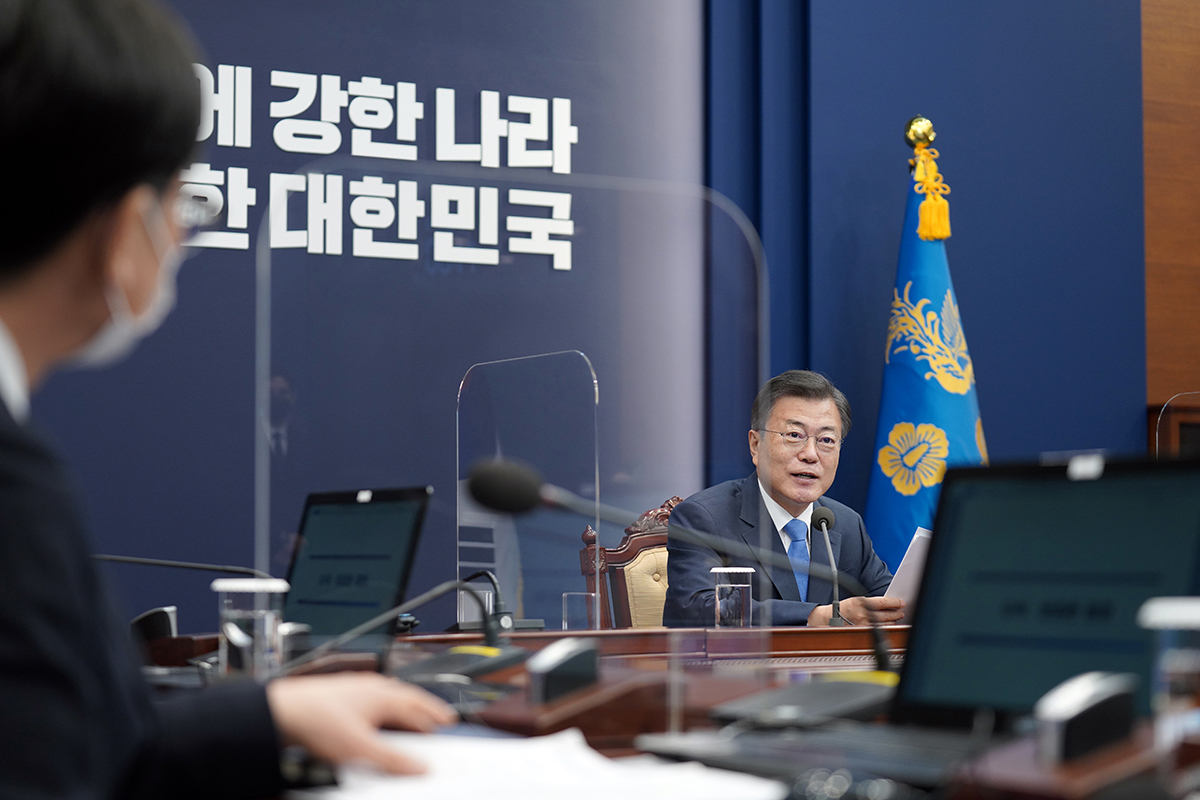Moon hints at further easing of COVID-19 restrictions
New antivirus guidelines, based on responsible autonomy, will be announced in March
By Lee Ji-yoonPublished : Feb. 15, 2021 - 16:50

President Moon Jae-in on Monday hinted at further easing of the nation’s COVID-19 social distancing rules to boost the pandemic-battered economy, especially hardest-hit small business owners.
“We can no longer ignore the urgent appeals (from small businesses). The government will come up with new social distancing measures in March when full-fledged vaccinations start,” the president said during a weekly meeting with his key aides.
He stressed a strategic shift in the nation’s quarantine rules based on “autonomy and responsibility,” saying “While compulsory measures like gathering bans and business closures are minimized, punishment for quarantine violations will be strengthened.”
“This is our new challenge and its success depends on people’s mature citizenship,” he added.
The president’s remarks came after the government last week lowered the social distancing to Level 2 – the third highest in a five-tier system – for the greater Seoul metropolitan area and Level 1.5 for other areas, for two weeks starting Monday.
The adjustment allows restaurants, coffee shops and gyms in Seoul and the surrounding Gyeonggi Province to remain open for an hour longer to 10 p.m., while a ban on private gatherings of five or more people remains in place.
The one-hour extension in business hours, however, was met with a mixed reaction. Small business owners, in particular, were skeptical about the effectiveness in recovering their huge losses amid the prolonged pandemic.
“I trust our people. Adding to vaccines and treatments, the new quarantine rules based on autonomy and responsibility will help advance the timing of our back-to-normal lives and the economic recovery,” Moon said.
The president also pledged “all-out efforts” to elevate the nation’s lowest employment rate since the financial crisis in the late 1990s. Citing the deepening polarization in the job market, he went on to say the service sector alone has lost almost 900,000 jobs, most of whom are temporary contract workers.
He added the government’s extra budget for the fourth round of emergency coronavirus relief handouts will include funding for job security.
The government and the ruling Democratic Party of Korea have started talks for the new round of relief funds to prioritize more vulnerable groups like smaller merchants. An estimated 15 trillion won ($13.6 billion) stimulus package is said to be being discussed. The previous package announced early this year was worth 9.3 trillion won.
In the meantime, Moon is expected to carry out his last major Cabinet reshuffle around April, replacing his economic team before his presidency enters the final year in May, according to Cheong Wa Dae sources.
Finance Minister Hong Nam-ki, who doubles as deputy prime minister for economic affairs, and the presidential chief of staff for policy Kim Sang-jo are likely to be replaced in the pending reshuffle. Both have maintained the posts despite three Cabinet shake-ups in recent months.
A replacement for Prime Minister Chung Sye-kyun, one of the presidential hopefuls in the ruling liberal bloc, is also likely to be named in the reshuffle. Former Interior Minister Kim Boo-kyum is cited as a possible candidate, while there is a speculation about a possible female prime minister for a gender balance in the Cabinet.
“In line with the reshuffle, the presidential office also plans for a modest reorganization to boost operational efficiency in the final year of the president,” a Cheong Wa Dae official said on condition of anonymity.
Moon has refrained from making drastic changes in his economic team that is considered closely linked to people’s livelihoods and related economic measures in the middle of the coronavirus pandemic.
After two busy months focused on diplomatic and political affairs, the president is expected to prioritize the response to COVID-19 for the time being, especially the nation’s vaccination campaign that starts later this month.
By Lee Ji-yoon (jylee@heraldcorp.com)



![[Herald Interview] 'Amid aging population, Korea to invite more young professionals from overseas'](http://res.heraldm.com/phpwas/restmb_idxmake.php?idx=644&simg=/content/image/2024/04/24/20240424050844_0.jpg&u=20240424200058)













![[KH Explains] Korean shipbuilding stocks rally: Real growth or bubble?](http://res.heraldm.com/phpwas/restmb_idxmake.php?idx=652&simg=/content/image/2024/04/25/20240425050656_0.jpg&u=)

